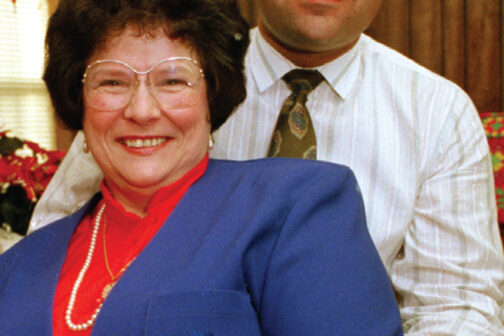With his father’s financial help, Gamal and a group of friends traveled to New York in 1980 to take more translation classes. Gamal loved the city. “I knew right away that I was going to immigrate to America as soon as I possibly could,” he says. In 1984, he moved to North Richland Hills with a high school friend who promised to help Gamal find work.

Gamal’s ability to handle thieves and root out dishonest employees, while also endearing himself to the community, soon put him at the top of Southland’s salary range. But one night in 1987, Gamal was in the back office of one of his stores, counting the day’s receipts, when he heard a commotion near the counter where his wife worked. He rushed out to see a robber beating Bertie, her face a bloody mess. When she tried to call 911, the robber pulled Bertie over the counter by her hair. A customer threw hot coffee on a second robber, and Gamal, believing his wife had been murdered, rushed out and tackled the first. She lived, but the incident ultimately led Gamal to quit Southland in March 1990, the same month he received his U.S. citizenship.
He began a yearlong contract position as a translator in Saudi Arabia for an American company that provided fitness training to Saudi air defense personnel. He was in Saudi Arabia during the build-up to the Gulf War. After the start of the U.S. air campaign, Gamal contacted the American consulate and offered his services free of charge to the American troops. But the war ended before his application could be processed.
His Saudi contract ended in April 1991, and Gamal returned to Fort Worth jobless. Two years later, he finally got work as a contract interpreter for the FBI. It needed him in New York. Months earlier, a group of radical Islamists led by a blind Egyptian cleric had exploded a car bomb that nearly took down the World Trade Center. The FBI had thousands of hours of surveillance tapes that needed to be translated. Gamal and Bertie packed their bags for New York.
•••
On a January night in 1995, the phone rang in Gamal’s Staten Island apartment. It was Andy McCarthy, the lead prosecutor in the government’s trial of the famed Blind Sheik, Omar Abdel-Rahman. A day earlier, Gamal had taken the stand for the first time to testify about the thousands of hours of surveillance tapes monitoring the fellow Egyptian—an alum of Gamal’s university, as it turned out. For nearly a year, Gamal had put in 80-hour weeks interpreting the surveillance gathered during the FBI’s most intensive terrorism investigation to date. That night, McCarthy’s voice on the phone was grave. He told Gamal to hurry to the office.
Gamal arrived at the federal building in Manhattan an hour later. His heart was pounding, and, despite the cold weather, he was sweating. Had he done something to compromise the case? Made a mistake on the stand yesterday? McCarthy and the FBI’s lead supervisor ushered him into the office.
“We’ve just gotten word,” McCarthy said, “that there’s a credible threat against your life.”
McCarthy explained that an FBI informant inside the Flatbush Avenue mosque had overheard heated discussions among close associates of the Blind Sheik. They were upset that a Muslim and fellow Egyptian would take the stand against the Sheik. The associates believed Gamal was no translator but rather a secret intelligence officer for the pro-American Egyptian government. They planned to assassinate Gamal.
McCarthy offered to let Gamal withdraw from the case so he wouldn’t have to testify. McCarthy said he’d provide Gamal a two-man protective detail and the costs of relocating him to a city of his choice. Gamal refused.
“I’m not going to let someone force me to change my whole life against my will,” Gamal said. “Threats like this are part of my job.”
Still, Gamal called his older brother in Cairo that night and warned him that the Sheik’s organization might try to harm the family. Gamal asked his brother to move Gamal’s college file, which contained family information and a home address.
Gamal testified against the Blind Sheik 18 times over the next 10 months. Every time, upon leaving the courtroom, Gamal would change his routine, double back, constantly checking for followers. The assassination threat revealed a vulnerability that would haunt Gamal from then on. Even if the bureau ensured his safety, it was powerless to protect his family in Egypt. But Gamal’s efforts were rewarded. A jury convicted the Sheik of masterminding the attack and sentenced him to life in prison in October 1995.
The World Trade Center bombing highlighted the FBI’s need for Muslim agents. It had none. This was by design. The FBI considered Muslims to be unreliable, more likely to become moles. Bureau thinking went that Middle Eastern culture encouraged a loyalty to religion above all else. But that thinking had to change, says Oliver “Buck” Revell, who headed the FBI’s counter-terrorism division for 11 years during the 1980s and 1990s. “We’ve used Italian-American agents, who spoke fluent Sicilian, to penetrate the mob,” Revell says. “We’ve used Russian-speaking agents to penetrate the Russian mob. That’s the same thing you have to do with any ethnically separated population. And collecting information from within the Arab-American community suddenly became very important after ’93.”
FBI recruiters sought out Gamal. But he was 36. The age cap for enrolling was 37, and at the trial’s end, he was nearing his birthday.
He went quickly through the training academy, graduating in 1996, the same year he and Bertie divorced. (She had not taken to New York, and there were other “irreconcilable” differences, the divorce papers said.) When asked where he wanted to be based, Gamal didn’t hesitate. He was heading to Dallas. He was going home.
•••







